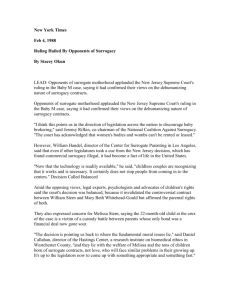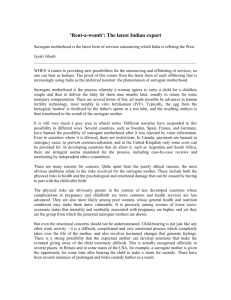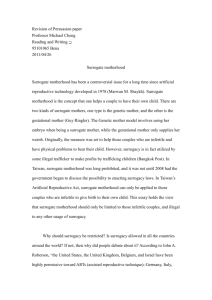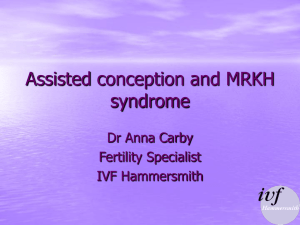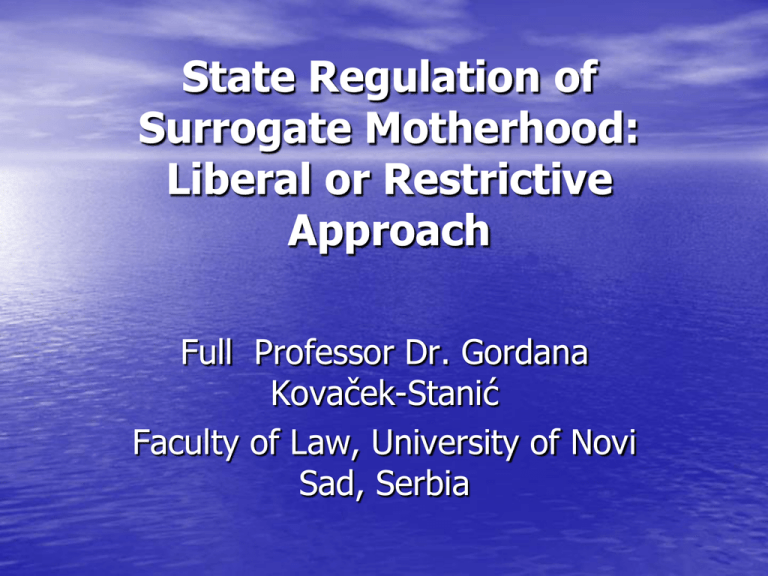
State Regulation of
Surrogate Motherhood:
Liberal or Restrictive
Approach
Full Professor Dr. Gordana
Kovaček-Stanić
Faculty of Law, University of Novi
Sad, Serbia
Family jurisprudence
• Surrogate motherhood, as one of the procedures of bio-
•
•
•
medically assisted reproductive technologies, provokes
different questions which has to be answered by family
legislation of a particular countries, but also, even before
by family jurisprudence.
One of them is issue of a biological origin of a person
The basic interest of an individual to know his/hers
genetic origin is psychological need for identity
Medical interest, as well
The right to know one’s
biological origin
• The right to know one’s biological origin is considered as
•
a human right and a personal right.
Personal rights might be subject to limitations. In the
jurisprudence of civil law, one speaks of a procedure for
balancing values and interests, so that the legislator in a
number of situations limits the exercise and disposal of
personal values, estimating that the realization of some
other values and interests is more important then the
realization of the particular personal value.
The right to know one’s
biological origin
• The procedure of balancing values and interests has an
•
exceptional importance when the right to know one’s
biological origin is concerned, as this right generally
concerns the rights of other people, and in particular the
rights of the genetic, gestational and legal (social)
parent.
The genetic parent (gestational mother) has interest to
privacy and non-disclosure of information. The
sociological parents, as a well-functioning family, have
an interest to protection of the family’s stability and
integrity.
The right to know one’s
biological origin
• The legal impossibility to find out one's origin, as a consequence of
the principle of anonymity, is an impossibility of primarily legal
nature. It can be factual as well, conditioned by the inexistence of
data about the donorship of the genetic material. The factual
inability is only the consequence of the legal one, because data can
be saved by keeping registers.
• Concerning the data showing which woman has given birth to the
child are difficult to hide because the commissioning couple and
the surrogate mother are acquainted, they sign a agreement, and
the commissioning couple then participates in the process of
pregnancy and child birth.
The right to know one’s
biological origin
• At this moment, a conflict is evident between the right to
find out one's origin and other rights, the right to privacy
of the biological parent or the surrogate mother, and the
security of a social family. The approach to this problem
primarily consists of evaluating the significance of the
conflicting rights, whether the solution of wider or
narrower possibilities to realise the right to know one's
origin depends on whether the significance of one or the
other right will prevail.
The right to know one’s
biological origin
• On the other hand, one might ask a question if it
•
•
is necessary that the right of the child to know
his/her genetic origin and the right to privacy
and family stability be in conflict.
Another possible approach would be to attempt
to eliminate the existing conflict of rights.
This solution assumes a radical change of the
legal, social and individual view to parenthood.
The right to know one’s
biological origin
• It would be necessary to accept and aprove of
•
the fact that the child may have more than two
parents with different roles (biological, i.e.
genetical parents, the gestational mother, and
the social or legal parents).
This theoretical solution is the closest to the real
circumstences. Whether family law will go in this
direction or not is left for the future to decide.
Forms of surrogate
motherhood
• A surrogate mother gives birth to a child
who is genetically hers (partial, genetic s.)
• A surrogate mother only carries and
delivers the child, the child genetically
belongs to the couple who wants the
child, either the egg cell of the third
woman (donor) is fertilised or the embryo
is donated (full, total gestational s.)
Forms of surrogate
motherhood
• Family surrogacy (between relatives)
• Friend surrogacy
• Surrogacy in which there is no prior
relationship betweeen the surrogate
mother and the woman who wants the
child.
Family surrogacy
• Mother for her daughter (becoming at the same time
•
•
•
the mother and grandmother)
Dughter for her mother and stepfather (becoming the
mother and half-sister of the child, and her children
half-brothers and half-uncles of the child)
Sister for her sister are relatively frequent (becoming the
mother and aunt)
Sister gave birth for her homosexual brother and his
partner by fertilisation of her egg cell with the sperm of
the partner (becoming the mother and aunt)
Family surrogacy
• The positive sides: no complications concerning the
•
•
concession of the child;family relation assumes that
surrogation came about exclusively for altruistic reasons
Negative sides: a confusion between relatives, double
relations. This fact can have different significance in
different social circumstances, depending on how much
a society gives importance to family relations.
A danger that the woman who cannot give birth to a
child asks a relative to be sm, and if a relative refuses or
consents against her wishes, the relatioship between
them may be disrupted.
Friend surrogacy
• Friend surrogacy: Similar positive sides as the
•
sur. between relatives, but it does not have the
essential negative side related to the confusion
of family relations.
Negative side is connected to the different
understanding of the acceptability of surrogate
motherhood as a manner of childbirth which can
lead to disruption in the relationship between
the parties connected by friendly relations.
Surrogacy- no prior
relationship
• Positive side is that there is no disruption in family or
•
•
•
frindship relations
Negative side is that it includes the commercial element
In the countries in which surrogacy is allowed and
regulated, only a sum of money given that is considered
reasonable is generally accepted, such as medical
expenses, pregnancy expenses, and lost income
Commercialization in the sense of buying the child is
forbidden
Surrogacy- no prior
relationship
• Negative side the surrogate mother decides after
•
childbirth to keep the child
The opposite situation can happen as well, that neither
the surrogate mother nor the couple who commissioned
the child want to raise the child, because it does not
fulfill their wishes. A child with defects can be born, or
twins are born, and the couple wants only one child,
sometimes the child is of inadequate sex – legal
proceedings
Comparative law
• Legislations that permit surrogate
motherhood: Greece, the United Kingdom,
Israel, Ukraine, Georgia, Romania (in
draft).
• Some countries, like the Netherlands and
Russia, do not have legislations about
surrogate motherhood, but this practice is
considered permissible.
Legislations which not permit
surrogate motherhood
• In a certain number of European countries
surrogate motherhood is not permitted
(Sweden, Norway) and in some it is
expressly prohibited (Germany, Austria,
France, Italy, Spain, Switzerland,
Slovenia).
Serbian legislation
• Serbian Constitution: everyone has the right to
•
•
freely make decisions about childbirth.
Nowdays legislation of Serbia does not permit
surrogate motherhood. Relevant acts are the
Family Act of Serbia 2005, and the Act of
Treatment of Infertility with Bio-Medically
Assisted Procedures 2009
Draft Civil Code: sm would be permitted alternative solutions
Serbian legislation
• Considering that in Serbia surrogate motherhood has not
•
•
•
•
been permitted up until now, and the question remains
how it would be received if permitted, we think the law
should start from more restrictive solutions.
Permit only full surrogacy
The genetic material should originate from at least one
of the persons who want the child, and perhaps it would
be simplest to start with surrogate motherhood only if
the genetic material originates from both persons.
Not allow posthumous fertilisation combined with sm.
Not allow surrogacy between relatives, considering the
social and legal importance of family relations in Serbia.
Serbian legislation
• At this moment, only married or heterosexual
•
extramarital partners should be considered as subjects
of surrogate motherhood, since in Serbia there is no
regulation for same-sex partnership, and it seems clear
that the rights of homosexual partners should not start
from reproductive rights.
A woman without a permanent partner should only
under special conditions, and only out of medical
reasons, with the permission of the court, have access to
surrogate motherhood.
Serbian legislation
• The important condition: residency of the
parties.
• The condition the surrogate mother has
already had children.
• Mandatory psycho-social counseling
Serbian legislation
• In positive Serbian law, the child does not
have the right to know his/her origins
according to the Act of Treatment of
Infertility with Bio-Medically Assisted
Procedures. The Draft of the Civil Code
provides a more contemporary solution,
according to which a child would have this
right.
Thank you for the attention

